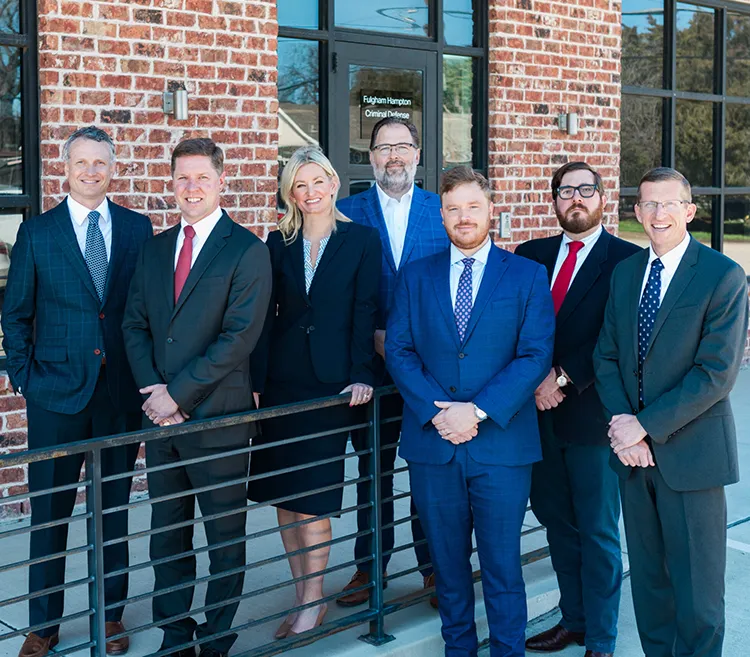A criminal records expungement in Weatherford, Texas, is a legal process that allows individuals to erase certain criminal charges from their records. This process removes the record from public view, essentially giving the individual a fresh start.
Expungement is typically available for cases that end in dismissal or acquittal and does not include serious offenses like felonies involving violence or sexual crimes. Successfully expunging a record can enhance employment opportunities, housing prospects, and overall quality of life by alleviating the stigma associated with a criminal history.
At Fulgham Hampton Criminal Defense Attorneys, we can determine your eligibility for a criminal records expungement. If you are eligible to move forward, we can guide you through every step of the process and help you pursue the expungement you deserve.
For a free case evaluation and legal consultation with a skilled Weatherford expungement lawyer, please call us at (817) 877-5201 or contact us online today.
Why Choose Us?

When it comes to pursuing a criminal records expungement in Weatherford, Texas, you want an experienced legal team fighting for you. At Fulgham Hampton Weatherford Criminal Defense Attorneys, many of our lawyers are former prosecutors, and we know how to view a case from every angle. We will aggressively fight for your rights during the expungement process and help you achieve your desired result.
Our knowledgeable team of Weatherford Criminal Defense Attorneys has 85-plus years of experience handling criminal matters, and we take a proactive approach with a strong track record of success. You can view our most recent client testimonials and case results at the following links.
Our office is conveniently located at 119 N. Main St., #220, Weatherford, TX 76086.
Negative Consequences of Having a Criminal Record in Weatherford
Having a criminal record in Weatherford, Texas, can lead to several negative consequences that affect various aspects of an individual’s life. These repercussions can be severe, often affecting employment opportunities, housing, and personal relationships.
- Employment Challenges – One of the most significant consequences of a criminal record is the difficulty in securing employment. Many employers conduct background checks before hiring, and a criminal history can be a red flag. Some professions – especially those involving vulnerable populations or requiring licenses – may outright disqualify individuals with certain convictions. This creates barriers to job opportunities, limiting the ability to achieve financial independence and stability.
- Housing Difficulties – Finding suitable housing can also be challenging for those with a criminal record. Many landlords conduct background checks and may refuse to rent to individuals with a history of criminal behavior. This can lead to homelessness or the need to live in less desirable conditions, bringing about a cycle of instability and hardship. Additionally, individuals may face restrictions in public housing programs, which often have strict eligibility requirements regarding criminal history.
- Social Stigma – The social stigma associated with having a criminal record can strain personal relationships. Friends, family members, and acquaintances may view individuals with a criminal history differently, leading to feelings of isolation and shame. This stigma can prevent meaningful connections and support networks from forming, which are essential for reintegration into society.
- Loss of Rights – In Texas, individuals with certain felony convictions may face the loss of specific rights, such as the right to vote or possess firearms. This loss of rights can contribute to feelings of disenfranchisement and can hinder civic engagement. In many cases, the inability to participate fully in society can lead to frustration and a sense of powerlessness.
- Effect on Education – Having a criminal record can also affect educational opportunities. Some colleges and universities consider criminal history during the admissions process. This can limit access to higher education, further hindering an individual’s ability to secure better employment in the future.
Criteria for Expungement in Weatherford
In Weatherford, Texas, expunging a criminal record can provide individuals with a fresh start by removing certain criminal charges from their history. However, not everyone is eligible for expungement. Here are the key criteria that must be met to qualify for this legal process.
- Type of Offense – The first consideration for expungement is the type of offense. Generally, only certain misdemeanor and felony offenses are eligible for expungement. For instance, Class C misdemeanors are usually eligible if they resulted in a dismissal or if the individual was acquitted. Felony offenses, particularly those involving serious crimes like violent felonies or sexual offenses, are often not eligible for expungement.
- Dismissal or Acquittal – To qualify for expungement, the case must ordinarily have been dismissed, or the individual must have been acquitted at trial. If the individual was convicted of the offense, expungement is generally not an option. In cases where a plea deal was accepted, the eligibility for expungement may depend on the specifics of the agreement and the nature of the charges.
- Waiting Period – In Texas, there is usually a waiting period before an individual can apply for expungement. For misdemeanor offenses, the waiting period is typically one to two years after the case is dismissed or the individual is acquitted. For felony offenses, the waiting period can be longer, often requiring a waiting period of five years after the completion of the sentence, including probation.
- No Pending Charges – Individuals seeking expungement must not have any pending criminal charges. If there are ongoing criminal cases, the expungement process cannot proceed.
- Proper Documentation – Finally, individuals must provide proper documentation to support their expungement application. This includes court records, proof of dismissal or acquittal, and any other relevant paperwork that demonstrates eligibility.
At Fulgham Hampton Criminal Defense Attorneys, we can provide guidance and increase the chances of a successful expungement application.
How Can We Help Throughout the Records Expungement Process in Weatherford?

Navigating the criminal records expungement process in Weatherford, Texas, can be complicated and overwhelming. However, having experienced legal help can significantly ease the journey. At Fulgham Hampton Criminal Defense Attorneys, here’s how we can help at every stage of the expungement process.
- Initial Consultation – The first step is an initial consultation, where we assess your eligibility for expungement. We will review your criminal record, the nature of the offenses, and any relevant court documents. This assessment helps clarify whether you qualify for expungement, ensuring that you do not waste time and resources on ineligible cases.
- Gathering Documentation – Once eligibility is confirmed, we assist in gathering all of the necessary documentation. This includes obtaining court records, arrest records, and any proof of dismissal or acquittal. Our team understands the specific requirements of the Texas legal system and can ensure that all documents are accurate and complete.
- Filing the Petition – Filing the expungement petition is a crucial step in the process. We can prepare and file the necessary paperwork on your behalf, ensuring that it complies with Texas law. Our experience in legal documentation helps prevent any mistakes that may delay your case.
- Communicating with Authorities – After filing the petition, it’s essential to notify relevant parties, such as law enforcement and the district attorney’s office. We handle this communication, thus ensuring that all parties are informed of the expungement hearing. This reduces the likelihood of complications or misunderstandings during the process.
- Preparing for the Hearing – If a hearing is required, we will prepare you for what to expect. This includes explaining the hearing process, helping you articulate your case, and advising you on potential questions or concerns that may arise. Our goal is to ensure that you feel confident and well-prepared.
- Representation at the Hearing – During the hearing, we can represent you and advocate on your behalf. Our legal knowledge allows us to effectively present your case, address any objections from opposing parties, and respond to the judge’s inquiries. Having legal representation can significantly improve your chances of a successful outcome.
- Post-Hearing Follow-Up – After the hearing, we can assist with any necessary follow-up actions. If the expungement is granted, we will ensure that the court order is properly executed and that your records are cleared. If the request is denied, we can discuss potential next steps, including options for reapplying in the future.
We offer comprehensive support throughout every stage of the records expungement process in Weatherford, Texas, ensuring a smoother and more effective journey toward a fresh start.
What Happens at an Expungement Hearing in Weatherford?

A records expungement hearing in Weatherford, Texas, is a crucial step in the process of clearing a criminal record. This hearing allows the court to review the expungement petition and decide whether to grant or deny the request.
- Scheduling the Hearing – After filing the expungement petition, the court schedules a hearing. The petitioner (the person seeking expungement) is notified of the date and time. It is important for the petitioner to be present at the hearing, as their attendance can significantly affect the outcome.
- Introduction of the Case – At the hearing, the judge will first introduce the case. The petitioner may be asked to provide basic information about themselves and the case they wish to have expunged. This includes details about the charges, the outcome of the case, and any relevant documentation that supports the petition.
- Presentation of Evidence – The petitioner will then have the opportunity to present evidence in favor of the expungement. This may include court records, proof of acquittal or dismissal, and any documents demonstrating that the individual has fulfilled the necessary waiting periods.
- Responses from Opposing Parties – If any law enforcement agencies or the district attorney’s office were notified of the hearing, they may present their objections or concerns. Their presence can be critical, as they may argue against the expungement based on the nature of the offense or other factors. The judge will allow both sides to present their arguments before making a decision.
- Judge’s Decision – After reviewing the evidence and hearing from all parties, the judge will make a decision. If the judge grants the expungement, they will issue a court order for the records to be cleared. Conversely, if the request is denied, the judge may provide reasons for the denial, which can help the petitioner understand any potential next steps.
- Conclusion of the Hearing – The hearing concludes with the judge’s decision being communicated to all parties involved. If the expungement is granted, the petitioner will receive a copy of the court order, which they can use to ensure their records are properly cleared.
As experienced criminal defense attorneys, we can represent you during your expungement hearing and pursue the result you want.
What are Your Options in Texas if Your Criminal Record Expungement Request is Denied?

If your criminal record expungement request is denied in Texas, you still have a few options to consider. First, you can appeal the decision. An appeal involves requesting that a higher court review the lower court’s decision. In this process, you’ll need to demonstrate that the judge made a legal mistake in denying your expungement. Keep in mind, however, that this option can be complicated.
Another option is to explore record sealing, also known as an “Order of Non-Disclosure.” While not as thorough as expungement, record sealing restricts who can access your criminal record. Only certain entities, like law enforcement and specific government agencies, can view sealed records, meaning most employers or the public won’t have access.
You may also consider applying for a pardon from the governor. If granted, a pardon can allow for your record to be expunged, even if it was previously denied. However, pardons are rare and can take a long time to process.
Finally, it’s important that you consult with an experienced Weatherford expungement attorney at Fulgham Hampton Criminal Defense Attorneys to review your case and see if you qualify for expungement or other relief under different grounds. We can guide you through the process, helping you explore alternative ways to reduce the effect of your criminal record.
Contact an Experienced Weatherford Expungement Lawyer Today
At Fulgham Hampton Criminal Defense Attorneys, our knowledgeable, compassionate, and experienced legal team can guide you through every step of the criminal records expungement process in Texas. We can also represent you during all legal proceedings and help you pursue a clean slate.
For a free case evaluation and legal consultation with a skilled Weatherford expungement attorney, please call us at (817) 877-5201 or contact us online right away.